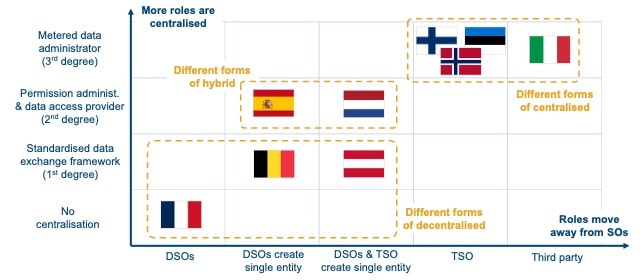Promoting energy consumer data exchange and interoperability: where do we stand?
Highlights from the event 'Fostering Interoperability across Borders: the Case of Energy Consumer Data’
Access to energy consumer data is crucial for supporting innovative, energy-related services that can benefit consumers and facilitate the transition to a low-carbon energy system. However, consumer data exchange can be organised in different ways and EU Member States have developed alternative data management models (DMMs) over time. In order to reduce the administrative burden for market participants and improve the competitiveness of retail markets, the EU has decided not to impose a single, standardised model to manage consumer data but rather to introduce transparent and non-discriminatory interoperability requirements and procedures via the adoption of the so-called ‘interoperability implementing acts’.
Two years after Commission Implementing Regulation (EU) 2023/1162 – the first of a series of interoperability implementing acts – was published, the FSR organised an online debate on 2 July 2025, in order to explore how EU Member States manage energy consumer data and how these implementing acts can support cross-border interoperability for innovative, data-driven energy services.
The online debate, titled ‘Fostering Interoperability across Borders: the Case of Energy Consumer Data’, was kick-started by Ellen Beckstedde (FSR), who presented a recent FSR policy brief written with Nicolò Rossetto (FSR) in the context of the EDDIE project, and hosted Kostantinos Stamatis (EC), Michèle Dion-Demael (ENTSO-E and RTE), Anna Maggioni (CEER and ARERA), and Anna Gorbatcheva (1KOMMA5°).
A heterogeneous landscape
EU Member States follow different models when it comes to the management of metering and consumption data. Some of them store data in a single data hub that takes part in all data exchanges, while others keep data close to the source, typically at the DSO level. Others adopt hybrid solutions, centralising certain elements of data management and not others.
In order to facilitate interoperability, Implementing Regulation (EU) 2023/1162 has introduced a reference model, containing a role model, an information model and a set of procedures necessary to support data access and exchange among market participants. The role model is particularly important, as it defines all the roles and the related responsibilities that can occur in data management, regardless of the entity that will perform them. Based on this role model and the entity or entities in charge of the single roles at the national level, it is possible to map the DMM adopted in the EU Member States and highlight some nuances that are less apparent in their traditional classification in centralised, decentralised and hybrid (see Figure 1).

Figure 1: A mapping of data management models in a selection of EU Member States (source: Beckstedde and Rossetto, 2025)
Implementing Regulation (EU) 2023/1162 does not limit itself to introducing a reference model; it mandates Member States to map their DMMs and report the relevant information at the European level. At the same time, ENTSO-E and the EU DSO Entity have received a series of tasks that they have decided to perform in the context of the Joint Working Group (JWG) on Data Interoperability. Among them, there is the duty of creating a repository where information about national DMMs reported by Member States is stored and made available to all market participants. The repository went live in July 2025 and already contained information about 12 Member States at the end of September 2025.
More implementing acts to come
During the panel, Stamatis and Dio-Demael confirmed that two additional implementing acts are expected to be adopted in the coming months. They concern interoperability requirements and non-discriminatory and transparent procedures for access to data required for customer switching and demand response.[1]
A draft of the first act on data for customer switching was prepared by the JWG on Data Interoperability in 2024, submitted to the European Commission (EC), and subject to public consultation in Spring 2025. The text is now under comitology and its adoption is anticipated by the end of 2025. The goal of this act, Stamatis highlighted, is to ensure technical switching can smoothly occur within 24 hours by 2026, as foreseen by article 12(1) of the Electricity Directive.
The preparation of the second act on data for demand response is taking longer, also due to the necessity of ensuring consistency with the new Network Code on Demand Response, which is currently being revised by the European Commission. A draft of the act is expected to be submitted by the JWG to the EC by December 2025 and will include interoperability requirements and transparent procedures for access to demand response data, such as the master data of flexible resources and the data about flexibility bids and their activation.
What are the main insights so far?
The experts participating in the panel shared a few insights with the audience.
First, Stamatis recognised the valuable contribution provided by experts and stakeholders over the years. The importance of their role, Stamatis noticed, has been confirmed recently by the creation of the Data for Energy (D4E) subgroup within the Smart Energy Expert Group. Similarly, Dion-Demael stressed the establishment of panels gathering stakeholders’ representatives within the work streams of the JWG with the aim of providing information and feedback.
Second, Stamatis observed that the development of a reference model that could accommodate all the different national solutions was a struggle and took time. However, as Maggioni confirmed, building that model around a granular definition of the different roles in data management was a major achievement, which today supports a robust approach to interoperability that can adapt to the diverse environment existing at the national level. Ensuring the coherence of the reference model with the Harmonised Electricity Market Role Model (HEMRM) developed by ENTSO-E and others is one of the priorities of the JWG on Data Interoperability, Dion-Demael highlighted, as it establish a common language for everybody working in the field.
Third, Maggioni emphasised that ensuring compliance with legislation on privacy and data protection is not trivial. National competent authorities must consider this aspect carefully, as it may not be part of their daily business.
Fourth, Gorbatcheva noticed that establishing a centralised data hub is not necessary to support an effective and cost-efficient access to energy consumer data. However, fully decentralised DMMs pose additional challenges, as market participants must gather data from a plurality of data management systems. Establishing a ‘standardised data exchange framework’, which support interoperability without centralising data storage, can be an important step forward. In this case, data integration costs are reduced, and innovative businesses can be scaled up faster, to the benefit of innovators, customers and, eventually, the whole energy transition.
Some open questions
Two questions were raised towards the end of the panel debate and were left open for further discussion.
First, should national regulators play a bigger role in the institutional framework laid down by Implementing Regulation (EU) 2023/1162? The Regulation foresees an important role for the association of system operators in Article 11 and states that they “cooperate closely with representatives of national regulatory authorities”. However, given the novelty of the markets for innovative, data-driven, energy-related services, Maggioni wondered whether a more important and explicit role for regulators and regulatory oversight would be necessary.
Second, will easier access to consumer data be sufficient to kick-start the market for innovative services? In Italy, Maggioni argued, a user-friendly platform has been established since some years to facilitate customer access to their own data, but engagement has been relatively modest so far. Very few customers have logged in and not that frequently. Although the experience reported by Gorbatcheva was more positive, other incentives or a more extensive communication of the new opportunities available to consumers will be necessary to ensure a higher level of customer engagement.
These highlights are part of the work performed by the FSR in the context of Horizon Project EDDIE. This project has been co-funded by the European Union’s Horizon Innovation Actions under grant agreement No.101069510, EDDIE – European Distributed Data Infrastructure for Energy.

[1] Article 24(2) of the Electricity Directive says that the European Commission must adopt interoperability requirements and non-discriminatory and transparent procedures for access to the data referred to in Article 23(1) by means of implementing acts. The list in Article 23(1) includes data for customer switching, demand response and other services. No deadline for the adoption of the implementing acts is foreseen.






